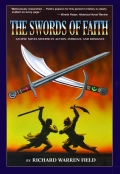More Than One Path to God—A Controversial Idea? May 19, 2011
Posted by rwf1954 in Christianity, God, Islam, religious fanaticism, religious tolerance, spirituality, Uncategorized.Tags: Christianity, God, Islam, Jesus, Koran, Mohammed, New Testament, religious fanaticism, religious fanatics, religious tolerance, spirituality
trackback
The key to religious tolerance is the recognition that there may be more than one path to God, more than one route to the Divine for the righteous, spiritual human being—that is one of the major themes of my novel about the “Third Crusade,” The Swords of Faith. True, two of the major religions of the world, Christianity and Islam, are proselytizing religions, professing only one legitimate route to God. But except for fanatics, haven’t we all grown to recognize the “more than one path to God” idea, not withstanding less tolerant tenets expressed by those faiths? Recent experience indicates to me that this is not as obvious to others as it is to me. This is an issue we need to face to establish peace in our times.
Let’s start by recognizing a little history. In the movie “Ben Hur” (recently compared to the original book in this blog, Books-Into-Movie Commentary – Special Easter Edition: “Ben Hur”), Balthasar, one of the three “wise men” of Christian tradition, turns to Ben Hur and says “there are many paths to God—I hope yours will not be too difficult.” This struck me as an extraordinary statement for a character who would become one of the first followers of the Jesus teachings. But this isn’t extraordinary at all. At that time, Jesus was preaching about a relationship with God. Christianity—its scriptures and tenets—did not exist. Judaism is not a proselytizing religion. In fact, there were no major proselytizing religions at this time. Conquerors in the ancient world simply adopted the gods from the peoples they absorbed and added them to their own gods. So Balthasar’s statement to Ben Hur, given with a tone of benevolence, of fatherly concern and love, makes complete sense.
Balthasar’s hope for Ben Hur still makes complete sense as a simple prayer for all of us to offer each other. But it is not so easy to offer now.
In my essay “Demonizing Islam is Both Wrong and Foolish” (published in Opposing Viewpoints: Islam), I touched on this obliquely, suggesting scriptures, especially those ripped out of context, should not be used to demonize any religion. I heard from angry detractors accusing me of moral equivalence among all religions. One stated to me that Christian scriptures appearing to be fanatic and extreme have been taken out of context, but that Muslim scriptures appearing to be fanatic and extreme were actually meant seriously and should be considered as entirely in context. His implication was that Islam truly is a “bad religion,” an unworthy path to God.
I am not arguing for moral equivalence among all religions. I have no trouble making the judgment that the Aztec priests tearing the hearts out of live human beings were practicing an evil religion. I’ll add to that the judgment that a Muslim fanatic who sends a Downs-Syndrome child strapped with bombs into a crowded area to kill as many innocent people as possible is committing evil in the name of his religion.
The question becomes how to judge these acts. I think this is not difficult at all. We can use a principle found in cultures from ancient Greece and ancient China to the Buddhist faith to Christianity and Islam—what is often called the “Golden Rule.” If you wouldn’t want your heart torn from your living body in front of masses of people staring at your final agony, don’t do it to someone else. If you wouldn’t want to be blown up, or sent unwittingly to blow up others, don’t do it to someone else.
For those who have touched the spiritual force, there is a feeling—I’ll call it love, but we’re talking about an inner glow beyond the love of a book, or a movie, or chocolate, or even a spouse or child. While under the influence of that feeling of spiritual glow, that love, we are not capable of tearing hearts from live victims, or scheming to use one innocent person to kill others.
I also believe another key to applying this concept is to judge humans and their spiritualities by their behaviors, not by their scriptures. This eliminates the debates over which religion has the most righteous tenets.
I also ran into resistance to this idea when a publicist I contacted left a polite voicemail indicating that because their firm is a “Judeo-Christian” company, they could not work on behalf of someone who advocates this idea. I deleted this voicemail too quickly—I should have called back to discuss this. I’m not sure this idea is so contrary to Judeo-Christian principles. The very phrase “Judeo-Christian” implies more than one path to God. But the reaction from this publicist has been part of my learning experience that this idea is more controversial than I believed it would be.
It was also surprising to me that I caught resistance from people I would consider to be on the other side of this argument when I argued that some people acting for religions needed to be resisted. I argued that violent fanaticism is the true danger in our world. I ran into real moral equivalence arguments as a result of this assertion. On a recent radio show appearance, I pointed out that Muslim fanatics, misappropriating their religion as they killed innocents, needed to be fought—by Christians, and by moderate Muslims who find this fanatic behavior as abhorrent as those of other faiths. I was told I needed to acknowledge that Christian fanatics were just as responsible for terrorism in our modern world. (I acknowledge that Christians have engaged in brutal activities in the past. That was not the argument. They were saying Christian fanatic terrorists are just as dangerous as Muslim terrorist today.) I asked for an example of a Christian terror network around the world trying to take as many innocent lives as possible. I was referred to the Illuminati and the Rothschild family (I think the Rothchilds were Jewish), and the “terrorism” of Proposition Eight in California against defining marriage to include same-sex unions. (I voted against Proposition Eight. I have written about this in one of my internet columns. I disagree with the state’s voters on this, but this is hardly terrorism!) They also mentioned fanatic Christian killings of abortionists. I wholeheartedly condemned that behavior; most Christians do too. But this activity hardly rises to the level of the worldwide assaults on innocents by Al Qaeda.
A blogger listened to my appearance, during which I repeatedly argued for more than one path to God and exalted moderate Muslims who have condemned fanatics, naming Muslim writer Kamran Pasha as an example of a man to be praised. The blogger condemned me as an anti-Islamic bigot, as a person who spreads “anti-Muslim propaganda.” Now, I have to say, this person ended her post by stating I was out of line to blame fanatic Muslims for the Nine-Eleven attacks—it was really the United States government that perpetrated the whole event. Okay. Consider the source. But it is a further illustration that this idea, seeming so obvious to me, comes with nuance and unforeseen ramifications in our modern world.
Still, I strongly believe by recognizing there may be more than one path to the spiritual force, to God, to whatever we call it, we find the key to ending religious wars. It is historical fact that Jesus and Mohammed, so-called “founders” of the two major proselytizing religions in our world today, were not focused on founding new organized religions. They were focused on assisting fellow human beings with finding the path to God. The scriptures, the formal tenets of these religions, did not form until decades after the deaths of these men. It is not in dispute that the New Testament of Christianity and the Koran of Islam were written down decades after these spiritual sages completed their time on earth. Both men were inclusive; they wanted to help humans from inside and outside their ethnic groups, traditions and birth religions to find God through their teachings. It can be argued that the “only one path to God” idea formed and developed through the efforts of later adherents to the original message, efforts directed at forming new organized religions. I believe Jesus and Mohammed would have been unhappy with the violent fanaticism generated by the “only one path to God” idea. We can honor them by embracing the idea of “more than one path to God.”






I couldn’t agree more!